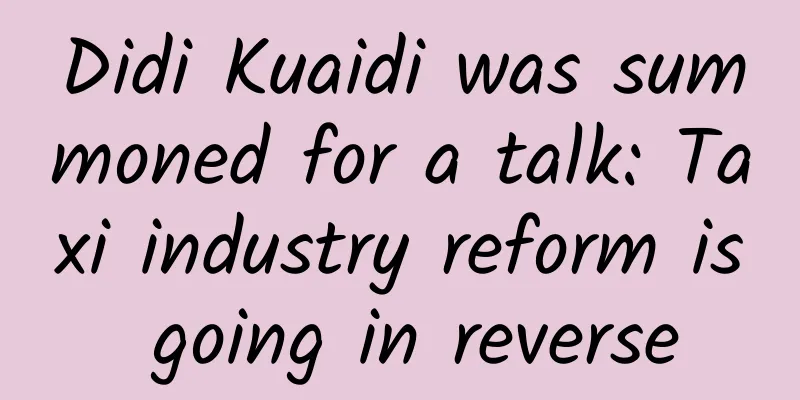Didi Kuaidi was summoned for a talk: Taxi industry reform is going in reverse

|
The policy relaxation in the private car sector that people are eagerly looking forward to may become a bubble. Not only that, if you observe carefully, you will find that the policy not only has a tendency to go backwards, but has even shown an incredible trend: monopolists have begun to use public power to exclude competition and tease the industry, enterprises and the public. Let’s first look at some recent developments. First, poor Didi Kuaidi. After launching the Orange Monday event last week, it was immediately interviewed by the Beijing Municipal Transportation Commission, the Municipal Transportation Commission Transport Management Bureau, the Municipal Transportation Law Enforcement Corps and other departments on June 2, saying that Didi Special Car and Didi Express violated the "taxi" operating regulations. The documents they brought were the "Decision of the State Council on Establishing Administrative Licenses for Administrative Approval Items That Must Be Retained", "Beijing Taxi Management Regulations" and "Beijing Car Rental Management Measures". The first two documents stated that taxi operators who provide transportation services according to the wishes of passengers and charge by mileage and time must obtain a qualification license. However, Didi Chuxing connects private cars and drivers and engages in passenger transportation services without permission; Didi Chuxing rents vehicles from rental companies and equips drivers to engage in passenger transportation services, which violates the "Beijing Car Rental Management Measures". Rental vehicles are not allowed to be assigned drivers to lessees, and lessees are not allowed to sublease vehicles. Obviously, Didi Chuxing is equated with taxis. However, according to the above documents, this identification has obvious loopholes. Although Didi Chuxing is called "Didi Chuxing", the vehicles are not sublet by Didi. The Didi Chuxing platform is just a service software based on the mobile Internet. It is responsible for matching passengers, leasing vehicles and drivers. The drivers are the ones who really respond to the needs of passengers. The drivers are neither from the leasing company nor recruited by Didi. In addition, Didi Chuxing does not charge by "time". Moreover, whether in terms of charging model or relationship with taxi companies, Didi Chuxing is obviously different from taxis, and applying the above-mentioned documents to restrict it is completely irrelevant. But what can it do? Frightened by the power of the "talks" by relevant departments, Didi can only promise to conduct self-inspection and rectification as required and carry out legal business. At the same time, it will further strengthen cooperation with government departments, establish a data monitoring platform and connect with government departments, and open up data information related to platform personnel, vehicles and orders. You can feel that a kind of public power is trying to recruit Didi Kuaidi and trying to obtain its most core operating data, with a tendency to seize it by force. This is in stark contrast to the open atmosphere that has been formed in the entire industry in recent months, and it makes people feel that someone is "reversing". Since last year, the Ministry of Transport of China has continuously released information, emphasizing the encouragement and regulation of innovation in taxi and car rental service models. At the beginning of last month, Yiwu issued a taxi reform operation plan, emphasizing that the taxi operating right usage fee will be completely abolished in 2016, the number will no longer be controlled from 2018, the fares will be determined by the market, and private car services will be encouraged. The Ministry of Transport publicly emphasized that Yiwu has provided a reference for the reform of the national taxi industry. Subsequently, Didi Kuaidi, the Shanghai Municipal Transportation Commission, and taxi companies jointly stated that they will jointly build the "Shanghai Taxi Information Service Platform", which will be launched on June 1, and private cars and carpooling will be included in the platform. This is seen as a trend to further launch the pilot. But some forces seem to be moving in the opposite direction of reform. On June 3, the Ministry of Transport held a closed-door symposium with many experts, local transport department leaders, taxi companies and taxi drivers to promote the initial ideas of deepening taxi reform. It is reported that taxis will be divided into cruising taxis and online booking taxis in the future. Special cars will be included in the category of online booking taxis, and the price will be based on the model. The vehicle must have an operating license and the driver must have a work permit. Private cars are prohibited from joining. The seemingly open move reveals a taste of conspiracy to monopolize. You can see that except for the people in charge of the department, all the participants in the closed-door discussion were representatives from the taxi system, without Didi, Kuaidi and the public representing passengers. Can this closed-door symposium within the same system formulate a taxi industry reform plan that meets market demands and leave real room for Didi Kuaidi? Carefully comprehend the information released by the above closed-door symposium. It is clearly just a so-called "reform" within the existing "taxi" industry: although taxis are divided into two types, namely cruising taxis and special taxis, the latter must have an operating license and the drivers must be qualified to work, and private cars are not allowed to enter. I don’t believe this is a true opening-up move. It is nothing more than a redistribution of benefits within the existing monopoly structure, and the beneficiaries will still be the monopolist itself. Because every implicit condition here excludes Didi and Kuaidi. "Operation license", every time I see this word, a wall always stands in front of me. Since Shenzhen first introduced the paid use system of operation license in 1988, "selling license" has become the key to the chaos in the taxi market. After the competent authorities issued a ban in 2004, more freaks were created. Many taxi companies rely mainly on it to obtain monopoly rights, and the survival mode of drivers is simply a mortgage: paying a share every day just to pay for the operation license. The cost structure of the entire industry is basically determined by it. This was also the first wave of expansion resistance that Didi Kuaidi faced. The subsidy war awakened the market, but the monopoly reality represented by the operating license quickly forced them into a corner. The launch of "private car" was actually a helpless move: they could only match the needs of car rental companies, drivers, and passengers to break through obstacles and gain survival space. But soon, the private car business faced growth pressure due to license control. When it integrated more than 20 car rental companies in 12 cities including Beijing Du'an Tongxin, Bus Bus, Shanghai Jiangnan Tourism, Nanjing Changfa Automobile, Chengdu Guoxin, and gathered a large number of drivers, it encountered the so-called "talk" today and had the above excuse. You can see that the information revealed at the closed-door symposium basically excludes Didi and Kuaidi, and instead focuses on monopoly enterprises or others. There is a very strange example. Yesterday, it was reported that Beijing Shouqi will officially enter the field of Internet-based private cars and will hold a press conference to announce the details in the near future. In fact, as early as 2011, Shouqi Leasing introduced designated drivers through labor services and carried out the "rental driver" business. Except for the vehicle level, this is actually a private car model. According to the above reasons, the Shouqi model should have been "interviewed" and "talked to" long ago. However, under the noses of regulatory departments at all levels in Beijing, it has been operating for 4 years without being investigated. This should be related to Shouqi's status. It is a 23-year-old state-owned enterprise. Shouqi Leasing currently ranks fifth among Chinese leasing companies, slightly behind eHi and Shenzhou. At present, it has more than 3,500 self-owned vehicles and more than 10,000 Shouqi (China) Car Rental Alliance vehicles. Obviously, in the past year, Didi Kuaidi has been subjected to a kind of internal and external differential treatment (state-owned enterprises and private enterprises) and selective law enforcement. This is not a fair and just market, but a pattern of collusion of interests formed by monopoly, which may imply a tendency to seek rent. You can see that there seems to be a combination of punches from a group of interested parties here, and no matter how Didi and Kuaidi try to hide, they can't get around it. 1. The first punch: In a seemingly improving policy atmosphere, a sudden "talk" was made to deter; 2. The second punch: The closed-door talks conveyed the so-called preliminary reform trend, which was actually just to create space for the internal distribution of interests in the monopoly structure. The old state-owned enterprise Shouqi spoke out at this time, probably because of public relations; 3. The third punch: I believe that it is very likely that it will put on a gentle attitude and give Didi and Kuaidi a kind of comfort in form, but it is just like during the interview, asking Didi and Kuaidi to give up their core interests in disguise, system docking, core data sharing, and even involving commercial secrets, which is enough to make it unbearable. You can see that with every innovation, Didi Kuaidi has broken through a barrier, and almost every business has left a deep scar. Didi Kuaidi recently launched designated drivers and ride-sharing services, which are also new moves under pressure. I believe it will encounter new barriers. When Didi Kuaidi keeps picking out the wording of the policy to find a legal reason for its existence, it makes people feel a little sad. This is a shameful scene for the industry. What I hope is that the competent authorities in the field of transportation in China should learn from the attitude of the China Banking Regulatory Commission and other departments towards the Chinese P2P market. In the face of a series of runaway cases, it not only did not introduce laws that were too tight to fit certain expectations, but gave the market enough room for trial and error. In the end, we saw that the market not only did not cause huge panic and systemic risks, but began to move towards self-discipline and standardization. The Chinese travel market also hopes to gain space for trial and error and free development. However, we have seen too many cases of crackdowns, lawsuits, and raids on offices, and too much administrative violence of rudeness, inaction, fear of action, and arbitrary action, which are trying to kill the private car industry with one blow. In fact, the entire taxi industry is already an active volcano. I am not exaggerating, can you see the case of a driver slitting his throat in Shanghai, the driver suspension cases in many places, the phenomenon of taxis becoming "black cars", and the increasing number of mass incidents? The contradictions in this industry are on the verge of eruption. The paths taken by Didi Kuaidi, Yidao, and Uber may not be the best choice to promote industry change. But at the moment, they represent the power of innovation and are still under control. They are actually the best way to resolve the social pressure of travel difficulties. I firmly believe that in an era of mass innovation and great change, no one can really stop the innovators from moving forward. The various obstacles encountered by Didi and Kuaidi, especially the inconsistency of some departments in their policy caliber, are nothing more than a kind of anxiety and appeasement in the era of change. They dare not break the monopoly because it is deeply related to themselves. As a winner of Toutiao's Qingyun Plan and Baijiahao's Bai+ Plan, the 2019 Baidu Digital Author of the Year, the Baijiahao's Most Popular Author in the Technology Field, the 2019 Sogou Technology and Culture Author, and the 2021 Baijiahao Quarterly Influential Creator, he has won many awards, including the 2013 Sohu Best Industry Media Person, the 2015 China New Media Entrepreneurship Competition Beijing Third Place, the 2015 Guangmang Experience Award, the 2015 China New Media Entrepreneurship Competition Finals Third Place, and the 2018 Baidu Dynamic Annual Powerful Celebrity. |
>>: Xiaomi Mi Band is hot-selling: Four ways to gain a foothold in the wearable market
Recommend
Only by placing accurate advertisements in this way can customers who really pay the bills see them.
In order to obtain the greatest benefits with the...
Several existing problems and solutions for App Store search
Apple's volatility has only increased recentl...
Deorbiting Sails: The “Scavenger” of Space Junk
In the future, fireworks may not only rise from t...
If you don’t clean these 4 places on the rice cooker, be careful not to eat “cockroach steamed rice”!
When I was surfing the Internet some time ago, I ...
It took me more than a month to summarize 14 routines for event operations.
Whether it is an online or offline activity; whet...
Aite Tribe Stories (8): Following the Dream and Starting a Business
[51CTO.com original article] The fish who longs t...
The latest and most complete tutorial for entering Douyin Store
Douyin's ability to sell products is obvious ...
4 steps to teach you how to do brand marketing promotion!
A good brand can only be reflected through good c...
If app stores don’t change, they’ll die.
[[134594]] The wave of mobile Internet entreprene...
After so much group sharing, your community is still half-dead?
Community entrance: high-quality content Think ba...
The 8th Seventh Orange Illustration Class
: : : : : : : : : : : : : : :...
What issues should be paid attention to when editing Baidu Encyclopedia, so as to create Baidu Encyclopedia entries 100% successfully?
What issues should be paid attention to when edit...
Six design patterns that Android developers must know
1 What is a design pattern? A design pattern is a...
No. 1 on the "dirtiest fruits and vegetables list"! Is it still edible to eat this fruit that is on the market in winter?
Winter is the season for sweet strawberries. Have...









